Costa Rica
Tour and Panama Cruise with CruiseWest
The Spanish City of Portobelo * Photos
and text by Jack
Yeazel
Return
to Home Page
GENERAL:
Panama is the region with the most historic events involving pirates
and the shipment of gold to Spain. The famous Nuestra Senora de Atocha
gold-laden ship, found by Mel Fisher, departed from Portobelo. Due
to its strategic geographical position, this country soon evolved into
one of Spain's most important trade routes during the time of the conquest.
Two fortresses where built on the Atlantic coast by the Spanish Crown to
protect transatlantic trade from the constant threat of pirates.
They are magnificent examples of 17th and 18th century military architecture.
Portobelo, (or Porto Bello as the Americans spelled it) is
a town in central Panama on the Caribbean Sea. The site, an excellent harbor,
was discovered by Columbus in 1502. The town itself was founded in 1597.
A thriving colonial city, it was connected by a stone highway with Panama
City; both ports were the points of transshipment for riches from
the Spanish Pacific domains. Believed impregnable, Portobelo was,
nevertheless, sacked by English buccaneers (William Parker in 1601, Sir
Henry Morgan in 1688, and Edward Vernon in 1739). The destruction
is clearly visible on the sea side of the old Customs House.
History is alive here and you can almost feel the presence of the conquistadores'
ghosts.
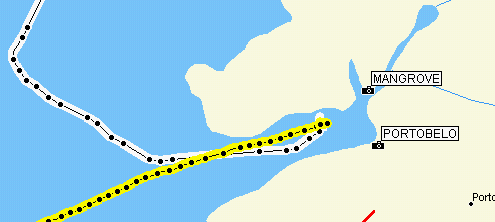
Map of Portobelo and a zodiac
tour of a mangrove river. (White track, leaving for the San Blas
Islands)
Click on the following
thumbnails for larger views
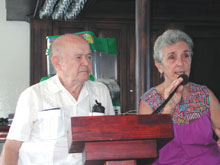 .....
.....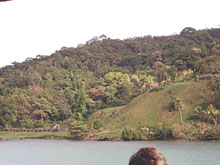 .....
.....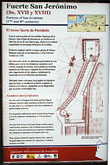
-
Residents, Mr. and Mrs. McGehee, come aboard
to explain the preservation work on the Spanish ruins.
-
Spanish fortifications across the bay from
Portobelo.
-
Site map of Fuerte San Jeronimo, the third
fort built in Portobelo. The entrance is at the bottom.
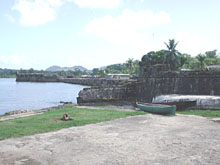 .....
.....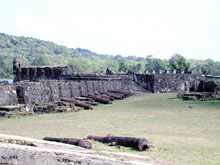 .....
.....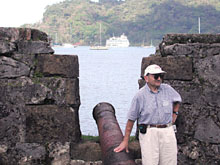
-
Looking northward from the fort entrance.
-
Inside the fort is a line of canon emplacements.
-
Malcolm slyly pushes a canon aside, so
it doesn't point directly at our ship!
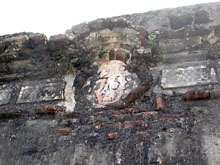 .....
.....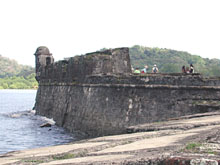 .....
.....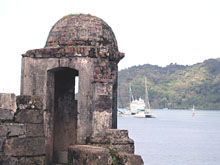
-
The fort was apparently dedicated in 1758
-
View close to the north end.
-
Observation post.
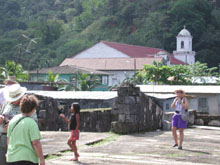 .....
.....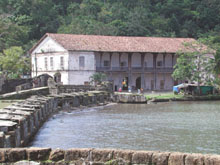 .....
.....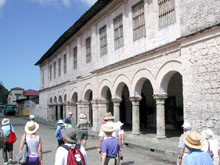
-
Looking south from the fort, you see first
the small "old church" and then the larger "new Church".
-
At the fort entrance is the Spanish Custom
House, the front heavily damaged by the British attacks.
-
The rear of the Custom House shows the
undamaged architectural style.
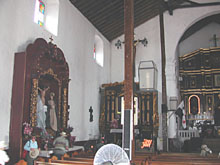 .....
.....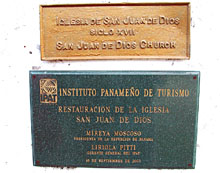 .....
.....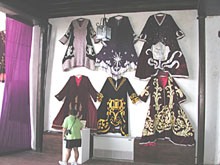
-
Inside the "New Church".
-
"Church of San Juan de God, Century
- XVII".
-
Costumes worn for festive occasions in
the "Old Church".
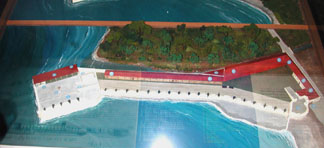 .....
.....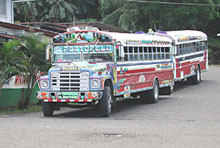
-
A model of the fort looking eastward with
the entrance on the right.
-
These colorful busses will gladly take
you back to Panama City, if you fear sea travel!
Now on to see the Kuna
People.

 .....
..... .....
.....

 .....
..... .....
.....